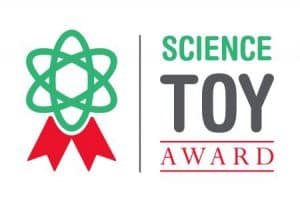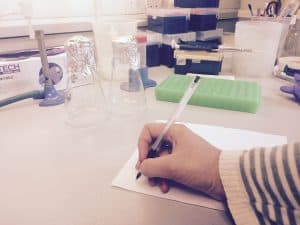This is the answer I got in a science festival after asking an 8-year-old kid if he knew where his DNA was. By the end of the activity, he learned that we are made of Lego-like pieces called cells where the DNA is kept, so you can’t lose it! He left with a smile from ear to ear holding a mini-chromosome we made together and telling his mom that when he grew old he wanted to be a scientist and study DNA. “If it is so important, we should know everything about it! he said.
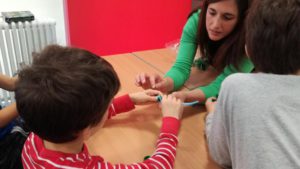
Building mini chromosomes in a Science Festival
A crucial part of science is to share your results and ideas not only with peer-researchers but also with non-specialist audiences. William Butler Yeats, one of the greatest poets of the 20th century and awarded with the Nobel Prize in Literature in 1923, said: ‘Think like a wise person but communicate in the language of the people’. Public engagement, defined as the bilateral communication process that occurs between the scientific community and society, is essential for the existence and development of scientific research. As a researcher, sharing your ideas with a wide audience helps you develop your communication skills, think about the impact of your research on people’s lives and get a fresh perspective on your work which might end up shaping your research. On the other side, public engagement can have a great impact on how wider audiences see research and researchers, apart from inspiring and raising aspirations.
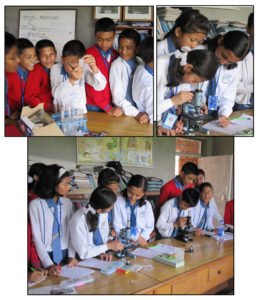
Science lab in West Wing School, Nepal
There are different ways you can communicate your research: social media, science festivals, school visits, art work, collaborations with the media… just focus on the idea you want to communicate and adapt it to your audience.
In my personal experience, getting involved in public engagement came so naturally that I didn’t even realise. After finishing my PhD in 2010, I travelled to Nepal to volunteer as an English teacher. By chance, I ended up teaching English at a school in a small Nepalese community and I thought: “I could also try to explain the students my PhD project, they might find it interesting…”. One thing led to another and the next thing I know is that I was setting up a mini-lab at the school’s library that ended up being a science communication-hub to engage students and teachers with research. Some students ended up coming to the lab at every break they had to help me look for samples for the microscope, to set up new experiments or to chat about science and what being a researcher is; we learned so much from each other!
I have been passionate about public engagement since then, and during the last few years I have been involved in several outreach projects from my research institute. I have also developed my own activity in collaboration with Natalia Torrea, “The DNA Journey” taking it with great success to different local science festivals and schools. Moreover, this year I have coordinated the organisation of Science Zone as part of the VI SRUK International Symposium, a science festival that hosted a variety of workshops and activities showcasing the research of SRUK members.
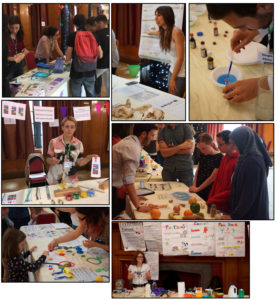
Activities at the Science Zone (VI International SRUK Symposium)
It has been the first time that we have opened the doors of our Annual Symposium to the public and the response was very positive. Participants made DNA bracelets while talking about the basic rules of base pairing: adenine (A)-thymine (T) and cytosine (C)-guanine (G). They learned, while playing with skulls, how we can study the evolution of dinosaurs, and they watched a movie of a real cell dividing that blew their minds. They also witnessed all the science behind our daily cooking, made milk fireworks and heard about the history of the plants we eat. They even got tomato and pepper plants to take home and grow their own vegetables!
The main feedback we got from the audience was how they enjoyed talking and asking questions to real scientists, which surprisingly looked like any other people! Parents highlighted that events like Science Zone encourage new generations to get involved in science. But not only the public, the researchers’ feedback showed how they also benefited from the event and enjoyed the discussion and interaction with the audience. A great experience for everybody which made me realise that all scientific meetings should always have an open day to the public… do you think this is something we may witness in future conferences?
Research and engagement are closely connected and they benefit from each other. Besides, it is great fun, so I encourage you to try it, if you haven’t done it yet!
By Dr. Alba Abad. Postdoctoral Researcher at the Wellcome Centre for Cell Biology. University of Edinburgh. Scotland SRUK Constituency
If you are interested in public engagement, check the Public Engagement in the UK website
Or our recent webinars:
Boosting your research through Engagement
Beyond dissemination: The importance of dialogue in public engagement with research

